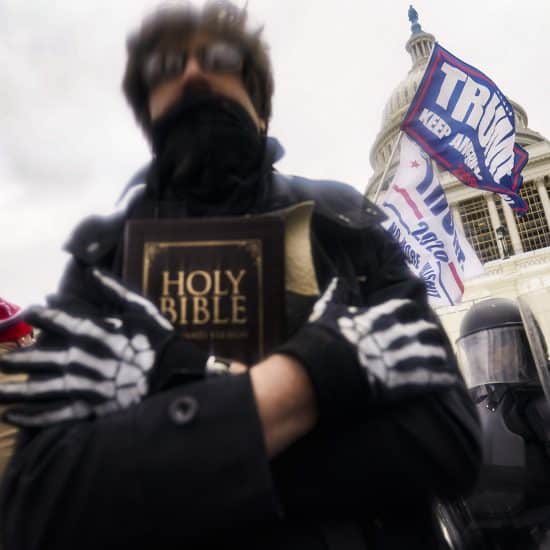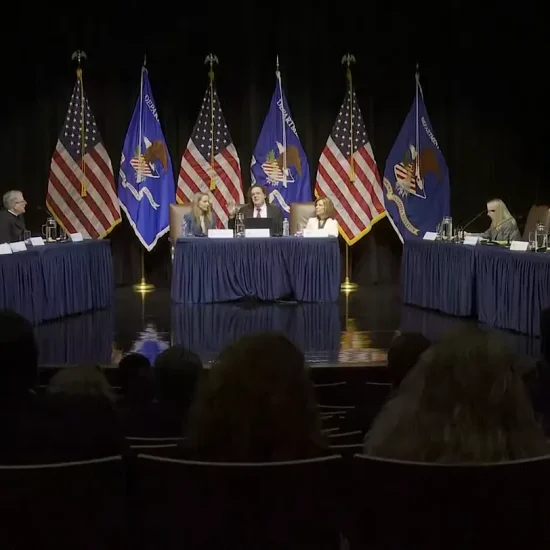
In June 2016, a lone evangelical political activist stood near the entrance of a New York hotel with a handmade sign condemning Donald Trump as hundreds of conservative evangelicals passed by to meet the new Republican standard-bearer. Four-and-a-half years later, that same man now cheerleads as his boss, Sen. Josh Hawley (R-Mo.), objects to Trump’s reelection loss.

Brian Kaylor
Like many others, Eric Teetsel moved in less than five years from condemning Trump as a dangerous man to backing Trump’s assault on American democracy. Such political conversions by evangelicals like Teetsel, Al Mohler, and others suggest that even when Trump leaves the White House this month, his mark on the White evangelical movement will remain for years.
“Torture is not pro-life,” Teetsel scribbled on his sign back in 2016. “Racism is not pro-life. Misogyny is not pro-life. Murdering the children of terrorists is not pro-life.”
Then beneath those all-caps red letters — with each “not” underlined — he added “Proverbs 29:2.”
“When the righteous are in authority, the people rejoice,” that biblical verse explains. “But when a wicked man rules, the people groan.”
Now that lone sidewalk prophet cheers on social media for his boss helping Trump make bogus claims as Trump tries to remain in office despite losing reelection. Teetsel, an evangelical activist who served as a faith adviser for the 2016 presidential campaign of Sen. Marco Rubio (R-Fla.), suggests without evidence that the election results in Pennsylvania can’t be trusted — despite numerous judges and election officials proving otherwise.
Even before the manufactured controversies following the most recent election, Teetsel seemed to be arguing with the sign-holding version of himself from four years ago.
In October, conservative “never Trump” evangelical writer David French argued “Donald Trump is not pro-life” and only “nominally anti-abortion.” Teetsel shot back with an allusion to the biblical book of Esther in which the namesake of the book convinces the king to stop his plan to execute Jews that the royal adviser Haman concocted.
“Do you think the Jews not murdered by Haman cared that Xerxes was nominally pro-Israel?” Teetsel wrote.
Comparing Trump to a godless biblical king who ran an international beauty pageant and ruled erratically while listening to a racist adviser, Teetsel self-righteously criticized anyone daring to hold up a sign declaring Trump as not pro-life. But those who work for the party of Xerxes might not be able to admit the biblical story clearly depicts Esther and her cousin Mordecai as the heroes deserving of the credit for stopping the genocide, not the violent king.
It’s quite a shift for someone who told a reporter while holding that sign in 2016 that “we have to be sure that we are representing the Gospel in truth.”
“A lesson that I have learned from this cycle is that very few Christians actually live according to a biblical worldview,” 2016 Teetsel added. “I think that this cycle has taught me we have done a terrible job of teaching everyday Christians to live out their faith.”

Christian imagery mixes with political and patriotic symbols at a “stop the steal” rally outside the Missouri Capitol on Nov. 7, 2020. (Brian Kaylor/Word&Way)
No longer able to stand in the political wilderness, Teetsel today joins the hundreds of conservative evangelicals walking by that guy with a sign. Instead, on Epiphany (Jan. 6), a day when we celebrate the wise political emissaries who refused an order of a mad king, many Christians pray for their representatives to overturn a free and fair election.
How could so many over the past five years move from viewing Trump as morally unfit for office to hoping for four more years of such rule? How can so many who, like Teetsel and Hawley and Mohler, long preached the importance of truth now be willing to repeat Trump’s lies about election fraud?
How can the same White evangelical leaders who taught me as a teenager in the 1990s that character matters now criticize me when I still say character matters? How could a tradition that claims to revere prophets speaking eternal truths sell out basic principles for temporary access to the oval throne?
Perhaps the answer is found a few verses after the one prophetically scrawled in red a few years ago: “If a ruler listens to lies, all his officials become wicked.”






